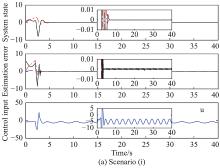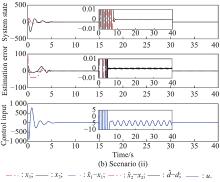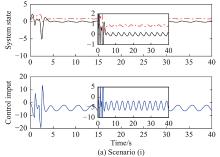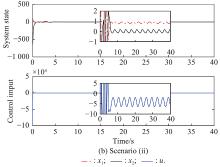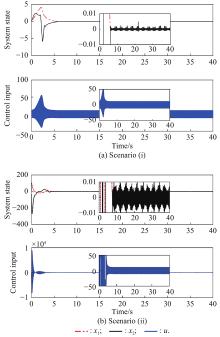| 1 |
GONG X, FU Y B, JIANG L X, et al Application of super-twisting extended state observer in fault reconfiguration of quadrotor aircraft. Systems Engineering and Electronics, 2020, 42 (9): 2077- 2084.
|
| 2 |
ZHAO Y, DONG L L Adaptive back-stepping control on container ships for path following. Journal of Systems Engineering and Electronics, 2020, 31 (4): 780- 791.
doi: 10.23919/JSEE.2020.000053
|
| 3 |
MIN H F, XU S Y, ZHANG Z Q Adaptive finite-time stabilization of stochastic nonlinear systems subject to full-state constraints and input saturation. IEEE Trans. on Automatic Control, 2021, 66 (3): 1306- 1313.
doi: 10.1109/TAC.2020.2990173
|
| 4 |
MIN H F, XU S Y, ZHANG B Y, et al Globally adaptive control for stochastic nonlinear time-delay systems with perturbations and its application. Automatica, 2019, 102, 105- 110.
doi: 10.1016/j.automatica.2019.01.004
|
| 5 |
UTKIN V, Sliding modes in control and optimization. Berlin: Springer-Verlag, 1992.
|
| 6 |
LEVANT A Higher-order sliding modes, differentiation and output-feedback control. International Journal of Control, 2003, 76 (9/10): 924- 941.
doi: 10.1080/0020717031000099029
|
| 7 |
DING S H, LEVANT A, LI S H Simple homogeneous sliding-mode controller. Automatica, 2016, 67, 22- 32.
doi: 10.1016/j.automatica.2016.01.017
|
| 8 |
SHI S, XU S Y, GU J, et al Global high-order sliding mode controller design subject to mismatched terms: application to buck converter. IEEE Trans. on Circuits Systems-I: Regular Papers, 2019, 66 (12): 4840- 4849.
doi: 10.1109/TCSI.2019.2933164
|
| 9 |
MIN H F, XU S Y, MA Q, et al Composite-observer-based output-feedback control for nonlinear time-delay systems with input saturation and its application. IEEE Trans. on Industrial Electronics, 2018, 65 (7): 5856- 5863.
doi: 10.1109/TIE.2017.2784347
|
| 10 |
MIN H F, XU S Y, ZHANG B Y, et al Output-feedback control for stochastic nonlinear systems subject to input saturation and time-varying delay. IEEE Trans. on Automatic Control, 2018, 64 (1): 359- 364.
|
| 11 |
BEJARANO F, FRIDMAN L, POZNYAK A Exact state estimation for linear systems with unknown inputs based on hierarchical super-twisting algorithm. International Journal of Robust Nonlinear Control, 2007, 17 (18): 1734- 1753.
doi: 10.1002/rnc.1190
|
| 12 |
LOZA A, BEJARANO F, FRIDMAN L Unmatched uncertainties compensation based on high-order sliding mode observation. International Journal of Robust Nonlinear Control, 2013, 23 (7): 754- 764.
doi: 10.1002/rnc.2795
|
| 13 |
FERREIRA A, BEJARANO F, FRIDMAN L Robust control with exact uncertainties compensation: with or without chattering? IEEE Trans. on Control Systems Technology, 2011, 19 (5): 965- 975.
|
| 14 |
BASIN M, PANATHULA C, SHTESSEL Y, et al Continuous finite-time higher order output regulators for systems with unmatched unbounded disturbances. IEEE Trans. on Industrial Electronics, 2016, 63 (8): 5036- 5043.
|
| 15 |
SHI S, XU S Y, YU X, et al Robust output-feedback finite-time regulator of systems with mismatched uncertainties bounded by positive functions. IET Control Theory and Application, 2017, 11 (17): 3107- 3114.
doi: 10.1049/iet-cta.2017.0291
|
| 16 |
MIN H F, XU S Y, ZHANG B Y, et al Practically finite-time control for nonlinear systems with mismatching conditions and application to a robot system. IEEE Trans. on Systems, Man, and Cybernetics: Systems, 2020, 50 (2): 2168- 2216.
|
| 17 |
YANG R M, PEI W H, HAN Y Z, et al Finite-time adaptive robust simultaneous stabilization of nonlinear delay systems by the Hamiltonian function method. Science China: Information Science, 2021, 64 (6): 169201.
doi: 10.1007/s11432-019-2804-2
|
| 18 |
ANDRIEU V, PRALY L, ASTOLFI A Homogeneous approximation, recursive observer and output feedback. SIAM Journal on Control and Optimization, 2008, 47 (4): 1814- 1850.
doi: 10.1137/060675861
|
| 19 |
POLYAKOV A Nonlinear feedback design for fixed-time stabilization of linear control systems. IEEE Trans. on Automatic Control, 2012, 57 (8): 2106- 2110.
doi: 10.1109/TAC.2011.2179869
|
| 20 |
NING B D, HAN Q L Prescribed finite-time consensus tracking for multi-agent systems with nonholonomic chained-form dynamics. IEEE Trans. on Automatic Control, 2019, 64 (4): 1686- 1693.
doi: 10.1109/TAC.2018.2852605
|
| 21 |
ZUO Z Y, HAN Q L, NING B D, et al An overview of recent advances in fixed-time cooperative control of multiagent systems. IEEE Trans. on Industrial Electronics, 2018, 14 (6): 2322- 2334.
doi: 10.1109/TII.2018.2817248
|
| 22 |
SHI S, GU J, XU S Y, et al Globally fixed-time high-order sliding mode control for new sliding mode systems subject to mismatched terms and its application. IEEE Trans. on Industrial Electronics, 2019, 67 (12): 10776- 10786.
|
| 23 |
SHI S, MIN H F, DING S H Observer-based adaptive scheme for fixed-time frequency estimation of biased sinusoidal signals. Automatica, 2021, 127, 109559.
doi: 10.1016/j.automatica.2021.109559
|
| 24 |
BASIN M, SHTESSEL Y, ALDUKALI F Continuous finite-and fixed-time high-order regulators. Journal of the Franklin Institute, 2016, 353 (18): 5001- 5012.
doi: 10.1016/j.jfranklin.2016.09.026
|
| 25 |
TIAN B L, ZUO Z Y, YAN X M, et al Fixed-time output feedback control scheme for double integrator systems. Automatica, 2017, 80, 17- 24.
doi: 10.1016/j.automatica.2017.01.007
|
| 26 |
NI J K, LIU L, LIU C X, et al Fast fixed-time nonsingular terminal sliding mode control and its application to chaos suppression in power system. IEEE Trans. on Circuits Systems-II: Express Briefs, 2016, 64 (2): 151- 155.
|
| 27 |
CRUZ-ZAVALA E, MORENO J, FRIDMAN L Lyapunov-based design for a class of variable-gain 2nd-sliding controllers with the desired convergence rate. International Journal of Robust and Nonlinear Control, 2018, 28 (17): 5279- 5296.
doi: 10.1002/rnc.4310
|
| 28 |
SHI S, GU J, XU S Y, et al Variable-gain second-order sliding mode controller with globally fixed-time stability guarantees. IEEE Trans. on Circuits Systems-II: Express Briefs, 2020, 67 (28): 1414- 1418.
|
| 29 |
LOPEZ-RAMIREZ F, POLYAKOV A, EFIMOV D, et al Finite-time and fixed-time observer design: implicit Lyapunov function approach. Automatica, 2018, 87, 52- 60.
doi: 10.1016/j.automatica.2017.09.007
|
| 30 |
MENARD T, MOULAY E, PERRUQUETTI W Fixed-time observer with simple gains for uncertain systems. Automatica, 2017, 81, 438- 446.
doi: 10.1016/j.automatica.2017.04.009
|
| 31 |
RIOS H, TEEL A A hybrid fixed-time observer for state estimation of linear systems. Automatica, 2018, 87, 103- 112.
doi: 10.1016/j.automatica.2017.09.019
|
| 32 |
BHAT S, BERNSTEIN D Finite-time stability of continuous autonomous systems. SIAM Journal on Control and Optimization, 2000, 38 (3): 751- 766.
doi: 10.1137/S0363012997321358
|
| 33 |
FILIPPOV A F. Mathematics and its applications. Differential equations with discontinuous right-hand sides. ARSCott F M, ed. Dordrecht: Kluwer Academic Publishers, 1988.
|
| 34 |
ANGULO M, MORENO J, FRIDMAN L Robust exact uniformly convergent arbitrary order differentiator. Automatica, 2013, 49 (8): 2489- 2495.
doi: 10.1016/j.automatica.2013.04.034
|
 ), Guosheng ZHANG1(
), Guosheng ZHANG1( ), Huifang MIN3,*(
), Huifang MIN3,*( ), Yinlong HU1(
), Yinlong HU1( ), Yonghui SUN1(
), Yonghui SUN1( )
)


